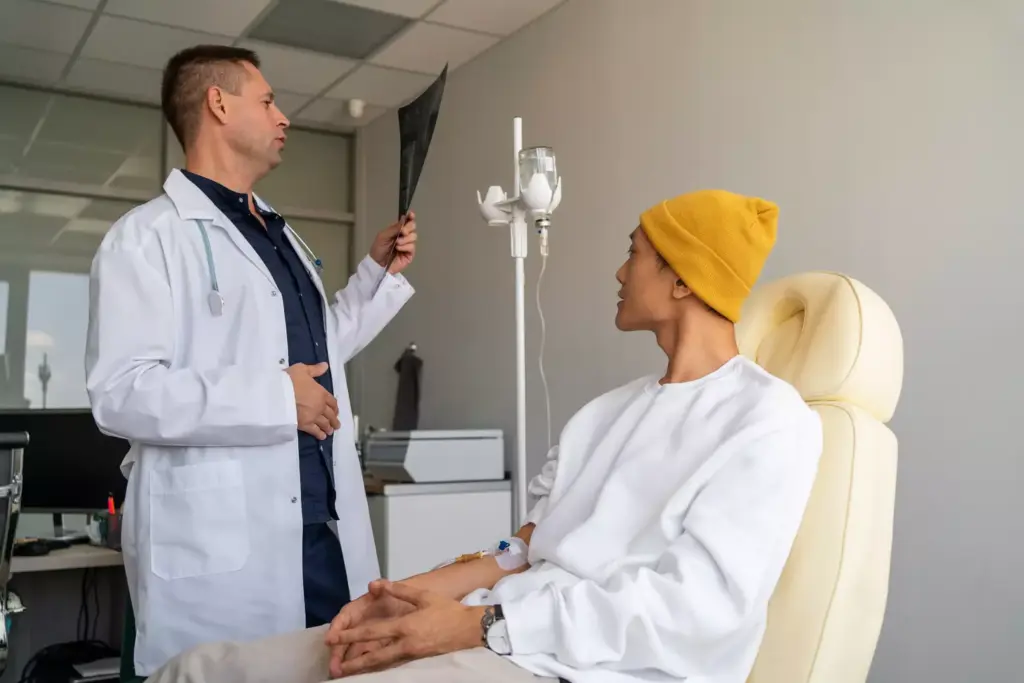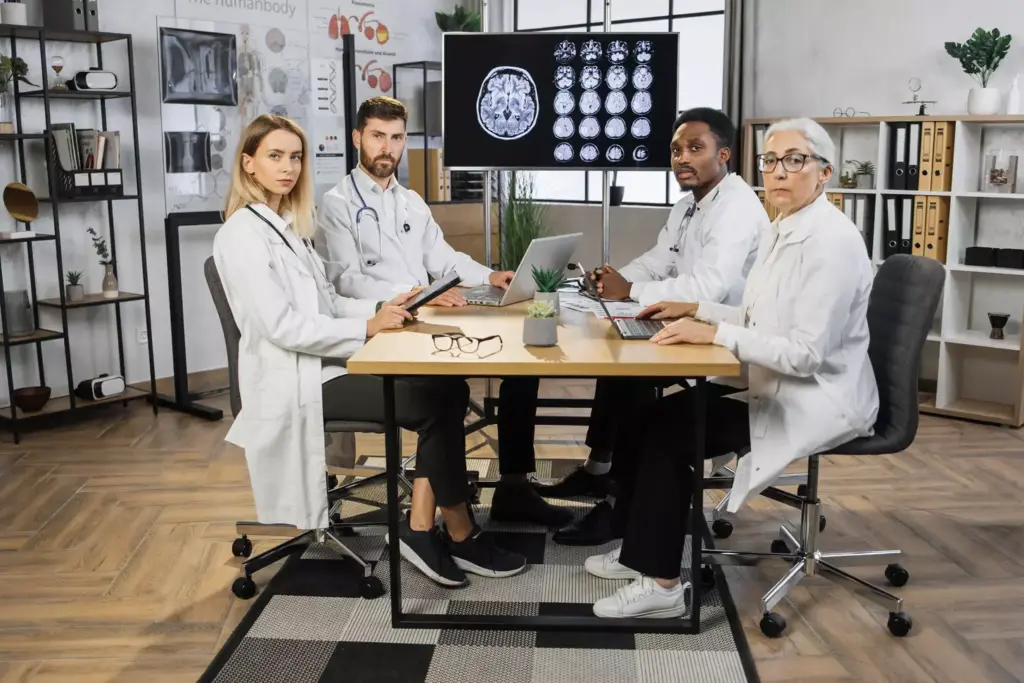Last Updated on November 26, 2025 by Bilal Hasdemir

Choosing the right oncologist is a big decision after a cancer diagnosis. It can greatly affect your treatment, quality of life, and peace of mind.
An oncologist is a doctor who deals with cancer. They diagnose, manage, treat, and research different types of cancer. We at Liv Hospital will look at important things to think about when picking a cancer doctor or oncologist. This way, you can get the best care.
Key Takeaways
- Understand the role of an oncologist in cancer care.
- Consider the oncologist’s expertise and qualifications.
- Evaluate the range of treatments and services offered.
- Assess the oncologist’s approach to patient care and support.
- Research the oncologist’s reputation and patient outcomes.
The Critical Role of Specialized Cancer Care
Specialized cancer care is key to treatment success. Choosing the right oncologist is vital. It affects your recovery journey.
Why Your Choice of Oncologist Matters
Oncologists focus on cancer diagnosis, treatment, and management. There are different types, like medical oncologists, surgical oncologists, radiation oncologists, and hematologist-oncologists. Each deals with a specific part of cancer care.
Don’t just rely on your primary care doctor’s referral. Research to find the best oncologist for you. Knowing the different oncology specialties helps you make a better choice.
How Specialized Care Impacts Treatment Outcomes
Specialized care greatly improves treatment results. Patients under specialists’ care often live longer and face fewer complications. The table below shows the benefits of specialized care.
| Treatment Aspect | Specialized Care | Non-Specialized Care |
|---|---|---|
| Survival Rates | Higher | Lower |
| Complication Rates | Lower | Higher |
| Treatment Personalization | More tailored to individual needs | Less personalized |
Specialized care leads to better survival rates and fewer complications. For more on oncologists’ roles, check Barton Associates’ blog.
Starting Your Search for the Right Cancer Doctor
Begin by asking your primary care doctor for recommendations. Also, look up oncologists online. Check their credentials, patient feedback, and what they specialize in.
Prepare a list of questions for your first meeting. Ask about their experience with your cancer type, treatment approach, and follow-up care availability.
Understanding the Different Types of Cancer Doctors
Knowing about the various cancer specialists is key to navigating cancer care. Cancer treatment involves many medical experts, each with a vital role in patient care.
Medical Oncologists: Specialists in Chemotherapy and Drug Treatments
Medical oncologists focus on treating cancer with systemic therapies like chemotherapy, targeted therapy, and immunotherapy. They are central in planning and coordinating care, tailoring treatments to each patient’s needs.
Surgical Oncologists: Experts in Cancer Surgery
Surgical oncologists are skilled surgeons who remove tumors and cancerous tissues. They work with other specialists to provide complete care, often doing biopsies and surgeries.
Radiation Oncologists: Specialists in Radiation Therapy
Radiation oncologists use radiation therapy to fight cancer. They employ methods like external beam radiation and brachytherapy to kill cancer cells safely.
Hematologist-Oncologists: Focused on Blood Cancers
Hematologist-oncologists deal with blood cancers like leukemia, lymphoma, and multiple myeloma. They manage both the blood and cancer aspects of these diseases.
There are also specialists like breast cancer doctors and gynecologic oncologists. Knowing about these experts helps patients make better choices for their care.
The main types of cancer doctors are:
- Medical Oncologists
- Surgical Oncologists
- Radiation Oncologists
- Hematologist-Oncologists
Understanding the roles of different cancer specialists helps patients navigate cancer care. It aids in making informed decisions about treatment.
The Importance of Specialized Expertise for Your Cancer Type
Cancer treatment is not a one-size-fits-all approach. A specialist with knowledge in your cancer type can greatly improve your chances. It’s vital to find a doctor with a lot of experience in treating your cancer.
Cancer-Specific Specialists
Different cancers need different levels of care. For example, breast cancer specialists know the latest treatments and surgeries for breast cancer. Gynecologic oncologists focus on cancers of the female reproductive system, giving targeted care that boosts treatment success.
Hematologist-oncologists specialize in blood cancers, and surgical oncologists are experts in removing tumors. Each brings their own set of skills and knowledge to the treatment table. This ensures patients get the right care for their cancer type.
Why Specialization Matters for Treatment Outcomes
Specialization in cancer care is more than just a title. It’s about having the knowledge and experience to provide the best treatment. Studies show that patients treated by specialists often have better outcomes, like higher survival rates and fewer complications.
For instance, a patient with a rare cancer may benefit from a specialist with experience in that area. This specialist can offer the latest treatments and clinical trials not found elsewhere.
Finding Doctors with Experience in Rare Cancers
Finding a specialist for rare or hard-to-treat cancers can be tough. But, there are resources to help. NCI-designated cancer centers and specialized cancer institutes have experts in rare cancers. Patients can also ask their primary care doctor for referrals or seek second opinions from experts in their cancer type.
When looking for a cancer specialist near me or the best oncologist near me, focus on their experience with your cancer type. This ensures you get the most effective and personalized care.
Verifying Credentials and Board Certifications
Checking an oncologist’s board certifications and credentials is key to choosing the right doctor. Getting a cancer diagnosis can be overwhelming. Picking a qualified oncologist is critical for your treatment’s success.
Essential Qualifications to Look For in an Oncologist
There are important qualifications to look for in an oncologist. Board certification is a top indicator of a doctor’s skill. In the U.S., the American Board of Internal Medicine (ABIM) or the American Board of Medical Specialties (ABMS) offer these certifications. They show the oncologist has completed extensive training and is very skilled.
It’s also important to check if the oncologist specializes in your type of cancer. Some doctors focus on specific cancers, like breast cancer. This focus can be very helpful for patients with rare or complex cancers.
How to Research a Doctor’s Background and Training
Researching an oncologist’s background involves several steps. Start by checking with your state’s medical board to confirm the doctor’s license and any disciplinary actions. You can also use online tools like the American Medical Association (AMA) Physician Profile or the American Society of Clinical Oncology (ASCO) Member Directory to find out about a doctor’s education and certifications.
Many cancer centers and hospitals also share information about their oncologists’ qualifications on their websites. It’s okay to ask your oncologist about their background, training, and experience with your cancer type.
The Significance of Fellowship Training and Continuing Education
Fellowship training is advanced education some oncologists get after their residency. It gives them specialized knowledge and skills. Continuing education is also vital in oncology, where new treatments and technologies keep coming up.
An oncologist who keeps up with the latest in cancer care can offer you the best treatments. Look for their commitment to ongoing learning and staying updated.
Evaluating a Doctor Treating Cancer: Experience and Track Record
Choosing a cancer doctor with a strong track record and lots of experience is key. It can greatly affect your treatment results. Look for a doctor with a good track record in treating your specific type of cancer.
Questions to Ask About Experience with Your Specific Cancer
To understand a doctor’s experience, ask specific questions. Here are some:
- How many patients with your specific type of cancer has the doctor treated?
- What is the doctor’s experience with the latest treatments and clinical trials for your cancer?
- Can the doctor share any success stories or case studies relevant to your condition?
These questions help you understand the doctor’s expertise and their ability to care for you well.
Understanding Success Rates and Outcome Statistics
Success rates and outcome statistics show how good a doctor is. When talking to your doctor, consider these points:
- What are the doctor’s success rates for treating patients with your specific cancer?
- How do the doctor’s outcome statistics compare to national averages?
- Are there any factors that could influence the doctor’s success rates, such as patient demographics or cancer stage?
Knowing these stats helps you make a better choice for your care.
The Value of Patient Volume in Building Expertise
A doctor’s patient volume is important for their expertise. More patients often mean more experience and better results. When looking at a doctor’s qualifications, think about this:
“The more cases a doctor treats, the more likely they are to refine their skills and develop effective treatment strategies.”
Choosing a doctor with many patients can boost your chances of getting top-notch care.
Assessing Communication Style and Doctor-Patient Relationship
Your oncologist’s communication style greatly affects your treatment. A good doctor-patient relationship is key to effective cancer care. It boosts patient satisfaction, treatment adherence, and overall well-being.
The Importance of Clear, Compassionate Communication
Clear and compassionate communication is vital. It helps you understand your diagnosis, treatment options, and prognosis. Georgia cancer specialists who explain complex info simply can reduce anxiety and improve your care experience. We seek doctors who balance empathy with medical knowledge, making you feel informed and supported.
Evaluating How Well the Doctor Listens and Responds
When meeting a breast cancer doctor, notice how they listen and respond. Do they let you fully share your concerns before reassuring or guiding you? A doctor who listens well and responds thoughtfully offers personalized care that meets your needs.
Cultural Sensitivity and Language Considerations
Cultural sensitivity and language skills are key in communication. A culturally sensitive doctor respects your beliefs, values, and preferences, affecting your comfort with treatment. If language barriers exist, the doctor or staff must communicate in your preferred language.
Consider these key points when assessing:
| Communication Aspect | What to Look For |
|---|---|
| Clear Explanation | Can the doctor explain your diagnosis and treatment in a way that’s easy to understand? |
| Active Listening | Does the doctor listen attentively to your concerns and questions? |
| Cultural Sensitivity | Is the doctor respectful of your cultural beliefs and values? |
| Language Proficiency | Can the doctor or their staff communicate effectively in your preferred language? |
By evaluating these communication aspects, you can make a better choice for your care.
Access to Advanced Treatments and Clinical Trials
Choosing an oncologist means looking for those who offer new treatments and clinical trials. These options can bring hope and improve treatment results.
How to Determine if a Doctor Offers Cutting-Edge Therapies
Ask your oncologist about new treatments during your visits. Ask about their experience with new therapies and if they’re involved in research. Also, check if they work with top research centers.
Key questions to ask:
- What new treatments are available for my specific type of cancer?
- Are there any ongoing clinical trials that I might be eligible for?
- How do you stay updated with the latest advancements in cancer treatment?
Understanding Clinical Trial Opportunities and Eligibility
Clinical trials test new treatments. They help improve cancer care and offer new therapies. Your oncologist will check your health, cancer type, and past treatments to see if you qualify.
| Clinical Trial Phase | Purpose | Patient Benefits |
|---|---|---|
| Phase I | Test safety and dosage | Access to new, potentially effective treatments |
| Phase II | Evaluate efficacy and side effects | Opportunity to receive treatments not yet widely available |
| Phase III | Compare new treatment to standard treatment | Potential for better outcomes with new treatments |
Balancing Innovation with Proven Approaches
New treatments and trials are exciting, but they must be balanced with proven therapies. Your oncologist will help you understand the risks and benefits of each option.
Knowing about treatments and trials helps you make informed choices. Always talk to your oncologist to find the best treatment for you.
The Advantage of NCI-Designated Cancer Centers
NCI-designated cancer centers are known for top-notch care and new research in cancer. They are recognized by the National Cancer Institute for their great work in cancer research and treatment.
What NCI Designation Means for Patient Care
Being NCI-designated means a cancer center meets high standards for care. This includes having teams of experts and access to new treatments. Patients get cutting-edge therapies and clinical trials that might not be available elsewhere.
“The NCI designation is a mark of excellence, indicating that a cancer center has the infrastructure, expertise, and commitment to provide the highest quality care.”
Benefits of Multidisciplinary Tumor Boards
NCI-designated centers have a big plus: multidisciplinary tumor boards. These boards gather experts from different fields to talk about patient cases. They work together to make detailed treatment plans. This teamwork means patients get coordinated and personalized care.
- Improved treatment outcomes through collaborative decision-making
- Access to a wide range of specialists and treatment options
- Enhanced patient support through coordinated care
Statistical Outcomes at Specialized Centers vs. General Hospitals
Research shows patients at NCI-designated centers do better than those at general hospitals. This is because these centers offer specialized care and advanced treatments.
| Treatment Outcome | NCI-Designated Centers | General Hospitals |
|---|---|---|
| 5-Year Survival Rate | 75% | 60% |
| Clinical Trial Participation | 20% | 5% |
| Multidisciplinary Care | 95% | 70% |
Looking for a cancer doctor or oncologist? Choosing an NCI-designated center is a smart move. It ensures you get top-quality, specialized care. For more info, visit the NCI website or talk to your doctor.
Insurance Coverage and Financial Considerations
Finding the right oncologist involves understanding insurance coverage. When you’re diagnosed with cancer, knowing the financial side of your care is key.
Navigating Network Restrictions When Choosing Oncologists
First, check if your oncologist is in your insurance network. This can lower your costs. Always verify the oncologist’s network status before choosing.
Key Considerations:
- Check if the oncologist is in-network
- Understand the implications of seeing an out-of-network specialist
- Review your insurance plan’s coverage for cancer treatment
Understanding Out-of-Pocket Costs for Cancer Treatment
Cancer treatment costs can be high. Knowing your out-of-pocket costs is vital. This includes copays, deductibles, and coinsurance. Talk to your oncologist and insurance about these costs to understand your financial obligations.
| Cost Component | Description | Example Cost |
|---|---|---|
| Copays | Fixed amount paid per visit or service | $20-$50 |
| Deductibles | Amount paid before insurance coverage kicks in | $1,000-$3,000 |
| Coinsurance | Percentage of costs paid after meeting deductible | 20%-40% |
Resources for Financial Assistance and Patient Advocacy
There are many resources to help with cancer treatment costs. Patient advocacy groups and financial programs offer support. A patient advocate noted,
“Navigating the financial aspects of cancer care can be overwhelming, but there are resources available to help patients access the care they need.”
Managing cancer care costs can be tough. By understanding your insurance, navigating networks, and using financial resources, you can focus on your treatment and recovery.
The Role of Second Opinions in Cancer Care
Getting a second opinion is key in cancer care. It gives patients valuable insights and peace of mind. A second opinion can offer a different view on your diagnosis, treatment plan, or prognosis.
A cancer diagnosis can be overwhelming. It’s natural to want to explore all options. A second opinion can make you feel more confident in your treatment choices and ensure you’re getting the best care.
When and Why to Seek a Second Opinion
There are times when a second opinion is very helpful. This includes when you’ve been diagnosed with a rare or complex cancer. It’s also helpful when your treatment plan is unclear or you’re unsure about the recommended course of action.
Seeking a second opinion is also a good idea if you’re considering a clinical trial. Or if you’re not satisfied with your current treatment and feel your concerns aren’t being addressed.
How to Request Medical Records for Consultations
To get a second opinion, you need to ask for your medical records from your current healthcare provider. This includes your diagnosis, treatment history, and any relevant test results.
Here’s a step-by-step guide to request your medical records:
- Contact your healthcare provider’s medical records department to find out how to request records.
- Give them your name, date of birth, and the specific records you need.
- Fill out any required forms or consent documents.
- Pay any fees for copying and processing your records.
What to Do When Opinions Differ Between Doctors
If a second opinion differs from your initial diagnosis or treatment plan, it’s important to understand why. You might ask questions like:
- What are the main differences between the two opinions?
- How do the recommended treatment plans compare?
- Are there any additional tests or evaluations that could help clarify the diagnosis?
To show the differences in opinions, consider the following table:
| Aspect | Initial Opinion | Second Opinion |
|---|---|---|
| Diagnosis | Stage II breast cancer | Stage III breast cancer with additional lymph node involvement |
| Treatment Plan | Lumpectomy followed by radiation therapy | Mastectomy with lymph node dissection and chemotherapy |
| Prognosis | 5-year survival rate: 85% | 5-year survival rate: 70% due to lymph node involvement |
In cases where opinions differ, it’s important to discuss the differences with both doctors. You might also want to consider a third opinion if needed. The decision should be based on a full understanding of your condition and the available treatment options.
Conclusion: Making Your Final Decision on a Cancer Doctor
Choosing the right cancer doctor is very important. It affects your treatment and care experience. Look at factors like specialty, credentials, experience, and how well they communicate.
We talked about different cancer doctors and why specialized care matters. Also, the benefits of NCI-designated cancer centers. It’s key to check credentials, look at a doctor’s past work, and how they talk to you.
As you decide, think about these things carefully. Ask important questions to get the best care for you. Making this choice is big, but with the right info, you can manage your cancer journey well.
FAQ
What is an oncologist, and what do they do?
An oncologist is a doctor who deals with cancer. They diagnose, manage, and treat different types of cancers. They also do research to find new ways to fight cancer.
How do I find the best cancer doctor or oncologist near me?
Start by asking your primary care doctor for recommendations. You can also search online and check with your insurance. Reading reviews from other patients can help too.
What are the different types of oncologists, and how do they specialize?
Oncologists specialize in different areas of cancer care. Medical oncologists use chemotherapy, while surgical oncologists perform surgeries. Radiation oncologists use radiation therapy, and hematologist-oncologists focus on blood cancers.
Why is specialization important in cancer treatment, and how can I find a specialist?
Specialization is key because it means you get care tailored to your cancer type. Look for doctors with advanced training and experience in your specific cancer.
How can I verify a cancer doctor’s credentials and qualifications?
Check their board certifications and fellowship training. Research their background and read reviews. Ask about their experience with your cancer type.
What questions should I ask a cancer doctor about their experience and track record?
Ask about their success rates and patient outcomes. Find out how they approach treatment and if they offer clinical trials. Also, ask how they stay updated with new cancer care advancements.
How important is communication style in choosing a cancer doctor?
Good communication is very important. A doctor who listens well and is clear can greatly improve your care experience. Look for someone who is responsive to your needs.
What are NCI-designated cancer centers, and what benefits do they offer?
NCI-designated centers are top places for cancer care. They offer the latest treatments and clinical trials. This can lead to better care and outcomes for patients.
How can I navigate insurance coverage and financial considerations when choosing a cancer doctor?
Check your insurance network and understand costs. Look for financial help and ask about insurance experience. This can make choosing a doctor easier.
When should I consider seeking a second opinion from another cancer doctor?
Get a second opinion if you’re unsure about your diagnosis or treatment. It can give you new insights or confirm your original diagnosis.
How do I request medical records for a second opinion consultation?
Ask your original doctor to transfer your records. Or, you can get copies yourself and give them to the new doctor.
References
- American Cancer Society. (n.d.). Choosing a cancer doctor. Retrieved from https://www.cancer.org/cancer/preparing-for-treatment/choosing-a-cancer-doctor.html
- CHC. (n.d.). How to choose an oncologist. Retrieved from https://www.thechc.com/chc-in-the-new/how-to-choose-an-oncologist/
- Rogel Cancer Center. (n.d.). Tips for selecting an oncologist and cancer treatment center. Retrieved from https://www.rogelcancercenter.org/living-with-cancer/treatment-choices/tips-selecting-oncologist-and-cancer-treatment-center
- Susan G. Komen. (n.d.). Selecting a physician (getting quality care). Retrieved from https://www.komen.org/breast-cancer/treatment/getting-quality-care/selecting-a-physician/
- MedlinePlus. (n.d.). How to find a doctor: patient instructions. Retrieved from https://medlineplus.gov/ency/patientinstructions/000928.htm








